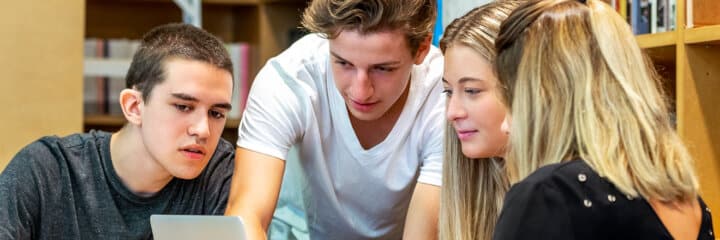Interacting – coordinating text understanding in a student theatre production
Martin Göthberg har i sin avhandling undersökt hur gymnasieelever förstår dramatext i en process – från en första läsning av okänd text till den kroppsliga gestaltningen i form av teaterföreställningar för publik.
Martin Göthberg
Professor emeritaMaj Asplund Carlsson, Högskolan Väst Professor Åsa Mäkitalo, Göteborgs universitet Cecilia Björck, Göteborgs universitet
Professor Vigdis Aune, Norges teknisk-naturvitenskapelige universitet
Göteborgs universitet
2019-03-29
Interacting – coordinating text understanding in a student theatre production
Institutionen för pedagogik, kommunikation och lärande
Interacting – coordinating text understanding in a student theatre production
The present dissertation explores student actors’ and their teachers’ coordination of text understanding in a theatre production – a two-semester process from page to stage in an upper secondary school in Sweden. With an interest in the collaborative work achieved in and through theatre education the research is realized against a background of the role of arts education and reading of literary texts in the neoliberal educational landscape that favors measurable effects of individual achievements. The overarching aim is to explore how text understanding evolves collaboratively as the participants transform drama text into stage text. This aim is pursued by investigating moment-to-moment contingency of unfolding social interaction in theatre activities grounded in a particular drama text. Analytically, such a focus is pursued by employing sociocultural and dialogical approaches to meaning making, creativity and learning. Data has been generated from ethnographic observation and video- and audio recordings of the participants’ staging of Molière’s The Affected Ladies, including the process from the first reading to the last performance. The unit of analysis applied to the data is tool-mediated activities, encompassing the participants, their interactions and the tools used. Three studies are reported through two articles and a licentiate thesis. The studies complement each other as the analytical work moved from ethnographic orientation into finer-grained scrutiny of talk- and action-in-interaction. The research design allows investigation of the micro-genesis of specific text understanding in relation to the overall transformation of a literary text into stage text, in which complexity of text understanding in artistic practice can be demonstrated. The results illustrate the situated, interactional ways in which the participants progressed from a position as newcomers to the drama text into a position of mastering the stage text. The findings show that anchoring text understanding in experiences in the material world developed the student’s perspectives on the text and expanded their action possibilities. They also show that students’ informal and playful role-playing provided the spaces necessary for appropriation of cultural and social interactional means that the students later re-used in rehearsal of scripted dialogue and in the stage text. One of the productive features was the dynamic, laminated interaction, including hybrid role-taking, in which substantial student agency surfaced. Such interaction supported collaborative realizations of meaning potentials in the situated habituation of characters’ manners. Stretched-out over the production period, the micro transitions of text understanding formed salient examples of emergent learning across formal and informal situations. There seems to be good arguments for doing more things with literary texts than ‘just’ reading them, in order to explore their inherent dynamics as layers of cultural meaning. To reduce learning arrangements to what seems efficient to reach measurable goals for the individual appears ill-judged considering the educational potentials of collaborative, creative, explorative and transgressive forms of learning illustrated in the present research.
Relaterade länkar

Juridik
 Gy–Vux
Gy–Vux
Fysisk aktivitet och motorik i förskolan
 Fsk
Fsk


